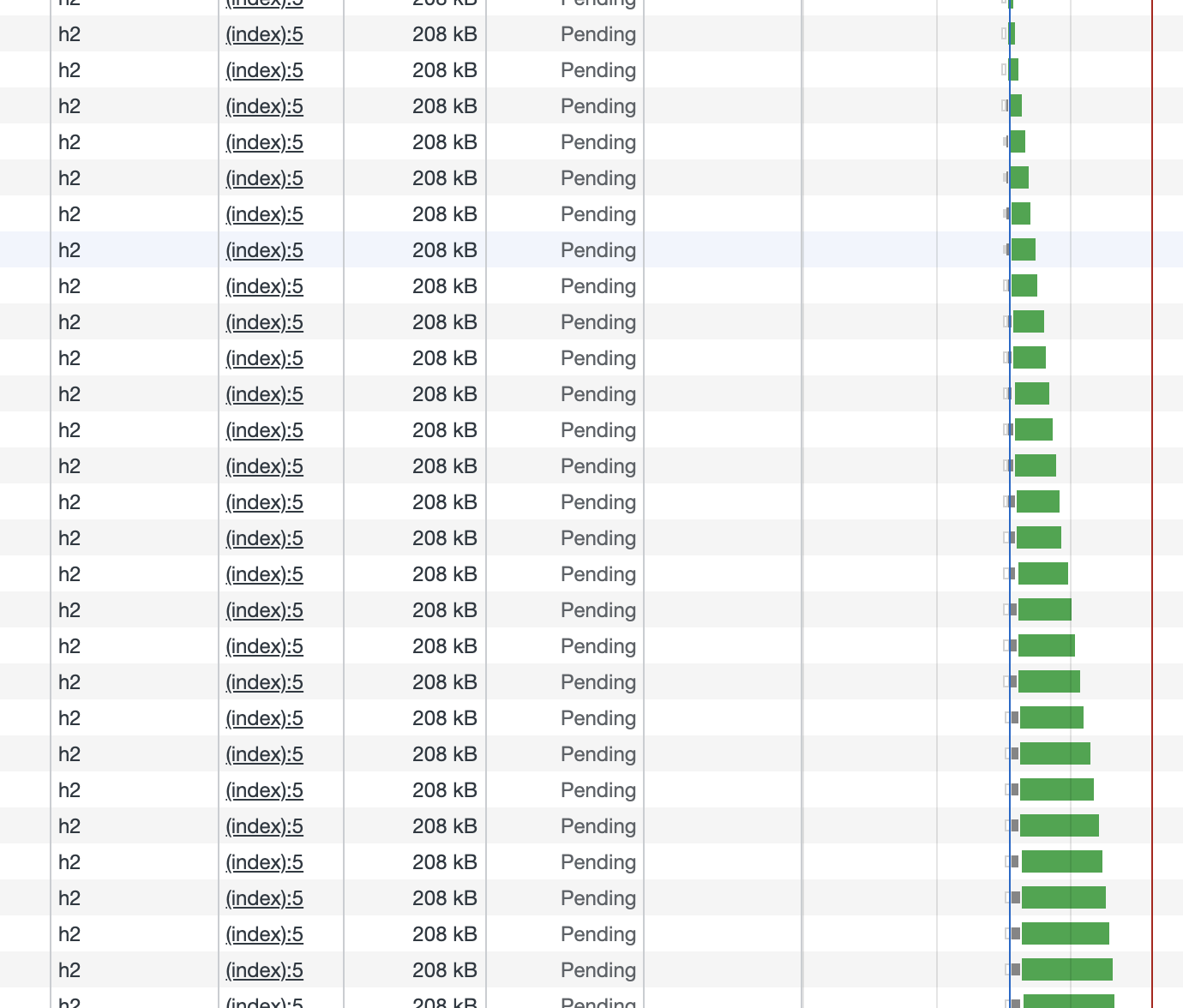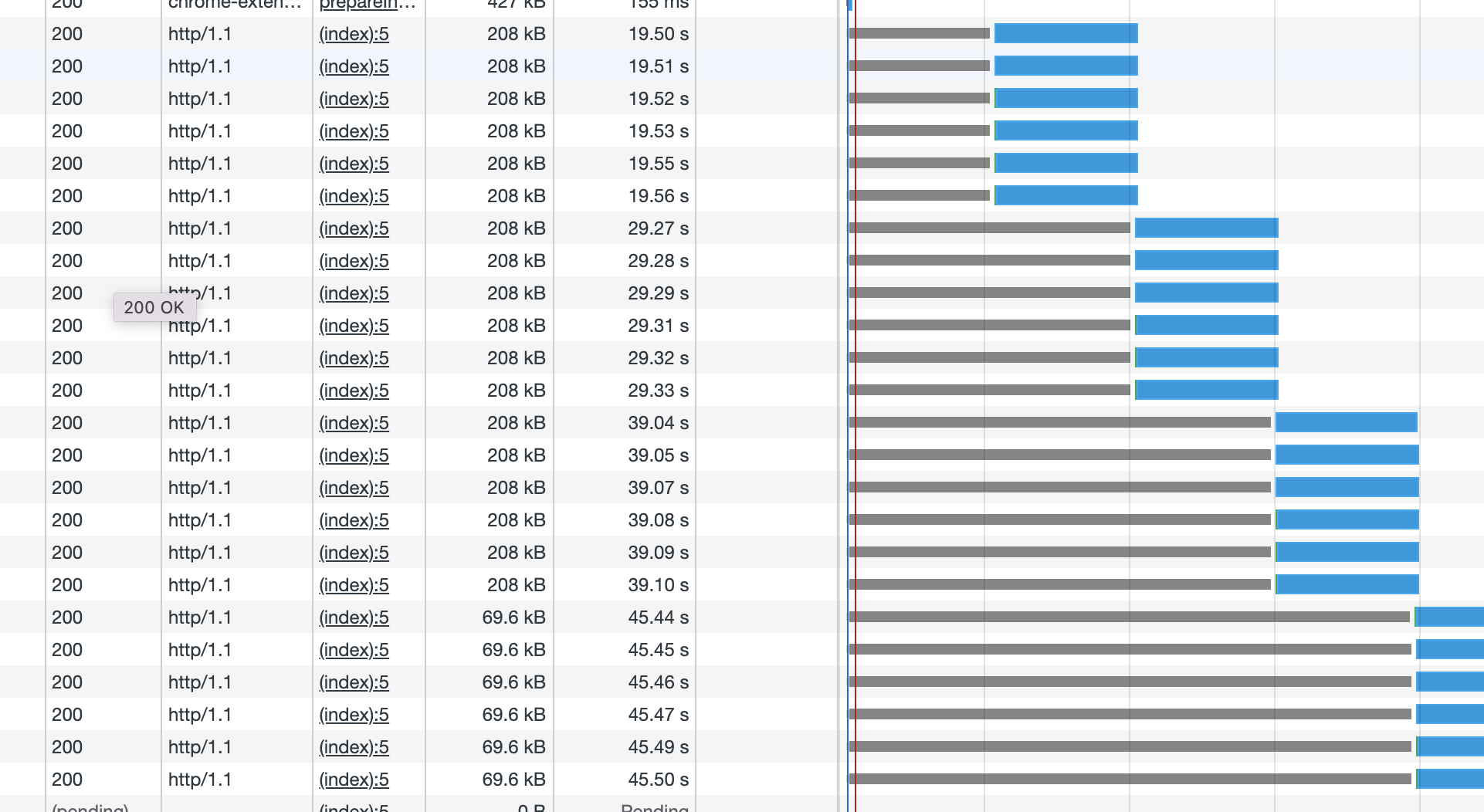在nodejs中体验http/2
前言
2015年,HTTP/2 发布,直到2021年公司的项目才开始在实践中应用;自己对http2诸多特点的理解只存在于字面上,于是尝试在nodejs中实践一下,加深自己的理解。
多路复用
同域名下所有通信都在单个连接上完成,消除了因多个 TCP 连接而带来的延时和内存消耗,这在大量请求同时发出的情况下能够减少加载时间。
使用如下代码查看http2环境下,资源下载的情况(浏览器开启限流和disable cache):
const http2 = require('http2');
const fs = require('fs');
const { HTTP2_HEADER_PATH } = http2.constants;
const server = http2.createSecureServer({
key: fs.readFileSync('localhost-privkey.pem'),
cert: fs.readFileSync('localhost-cert.pem')
});
server.on('error', (err) => console.error(err));
server.on('stream', (stream, headers) => {
// stream is a Duplex
const path = headers[':path'];
if(path === '/img.png' || path === '/favicon.ico'){
const fd = fs.openSync('img.png', 'r');
const stat = fs.fstatSync(fd);
const headers = {
'content-length': stat.size,
'last-modified': stat.mtime.toUTCString(),
'content-type': 'image/png'
};
stream.respondWithFD(fd, headers);
} else if(path === '/') {
stream.respond({
'content-type': 'text/html; charset=utf-8',
':status': 200
});
stream.end(`
<h1>Hello World</h1>
<script>
for(var i=0;i<50;i++){
fetch('/img.png')
}
</script>
`);
}
});
server.listen(8443);
可以看到当资源开始同时请求,所有的请求形成一个队列,请求之间开始时间相差大概1ms, 因为下载的是同一个图片,50张图片同时下载,最后几乎在同时完成下载。

下面是http1.1的例子,通过对比发现浏览器按照自己的最大并发量同时发出请求,只有当请求返回后才发出新的请求(浏览器开启限流和disable cache):
const http = require('http');
const fs = require('fs');
const server = http.createServer(function(req,res){
const path = req.url;
if(path === '/img.png' || path === '/favicon.ico'){
res.writeHead(200,{'Content-type':'image/png'})
var stream = fs.createReadStream('img.png')
stream.pipe(res)
} else {
res.writeHead(200, { 'Content-Type': 'text/html; charset=utf-8' });
res.end(`
<h1>Hello World</h1>
<script>
for(var i=0;i<50;i++){
fetch('/img.png')
}
</script>
`);
}
});
server.listen(8444);

服务端推送
按照如下代码测试
const http2 = require('http2');
const fs = require('fs');
const { HTTP2_HEADER_PATH } = http2.constants;
const server = http2.createSecureServer({
key: fs.readFileSync('localhost-privkey.pem'),
cert: fs.readFileSync('localhost-cert.pem')
});
server.on('error', (err) => console.error(err));
server.on('stream', (stream, headers) => {
const path = headers[':path'];
if(path === '/') {
stream.respond({
'content-type': 'text/html; charset=utf-8',
':status': 200
});
stream.pushStream({ [HTTP2_HEADER_PATH]: '/style.css' }, (err, pushStream, headers) => {
if (err) throw err;
const fd = fs.openSync('style.css', 'r');
const stat = fs.fstatSync(fd);
const header = {
'content-length': stat.size,
'last-modified': stat.mtime.toUTCString(),
'content-type': 'text/css'
};
pushStream.respondWithFD(fd, header)
});
stream.end(`
<h1>Hello World</h1>
<script>
setTimeout(()=>{
fetch('/style.css')
},2000)
</script>
`);
} else if(path === '/style.css'){
const fd = fs.openSync('style.css', 'r');
const stat = fs.fstatSync(fd);
const headers = {
'content-length': stat.size,
'last-modified': stat.mtime.toUTCString(),
'content-type': 'text/css'
};
stream.respondWithFD(fd, headers);
}
});
server.listen(8442);
资源加载情况如下,style.css的Initiator是Push,大小是66 B, 同时首页加载的大小是207 B,

注释掉stream.pushStream部分后,不使用推送,资源加载如下,style.css大小是89B, 同时首页加载的大小是182B,

综上所看,服务端推送可以提前加载资源,优化非首页加载有益。
令人高兴的是,因为使用率低,chrome在105版本后不再支持http2的服务端推送,导致这个特点在前端开发中可以忽略了。并且如果要测试改特点需要使用低版本的chrome,比如本例子使用的是chrome 96 mac版本。
另外在测试的过程中发现HTTP2是需要加密的,在本地用openssl生成了证书,访问的时候需要使用https;按照nodejs文档中的说法,没有浏览器支持未加密的http2。
本文所用代码:https://github.com/blank-x/pg/tree/master/http2,nodejs版本是v16.19.0.





【推荐】国内首个AI IDE,深度理解中文开发场景,立即下载体验Trae
【推荐】编程新体验,更懂你的AI,立即体验豆包MarsCode编程助手
【推荐】抖音旗下AI助手豆包,你的智能百科全书,全免费不限次数
【推荐】轻量又高性能的 SSH 工具 IShell:AI 加持,快人一步
· winform 绘制太阳,地球,月球 运作规律
· 超详细:普通电脑也行Windows部署deepseek R1训练数据并当服务器共享给他人
· 上周热点回顾(3.3-3.9)
· AI 智能体引爆开源社区「GitHub 热点速览」
· 写一个简单的SQL生成工具